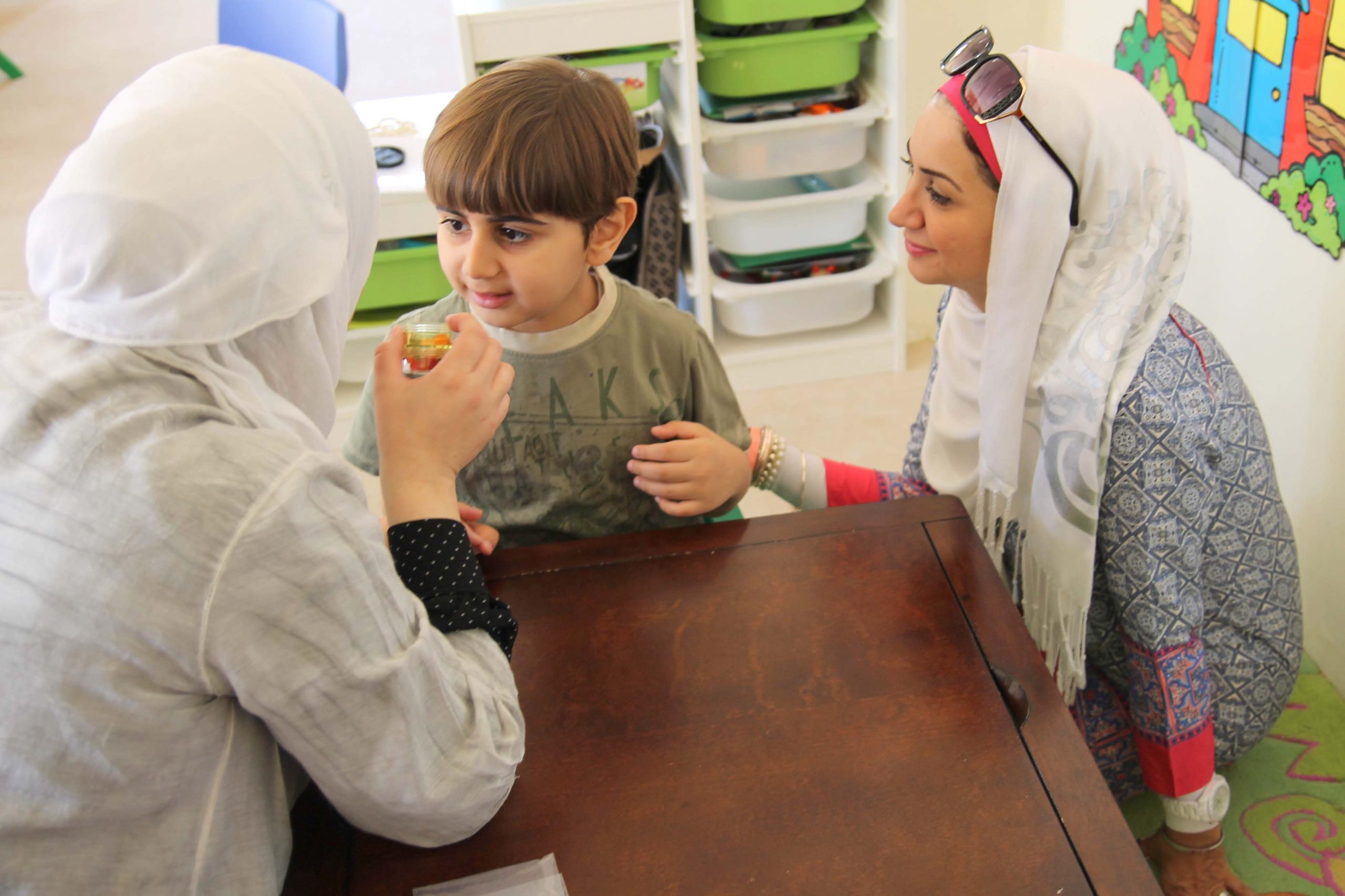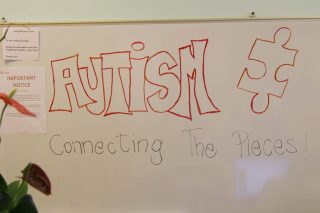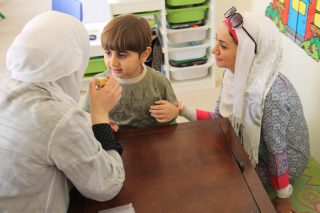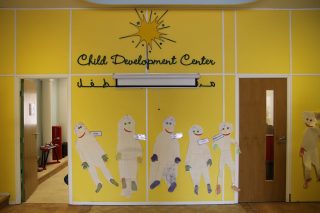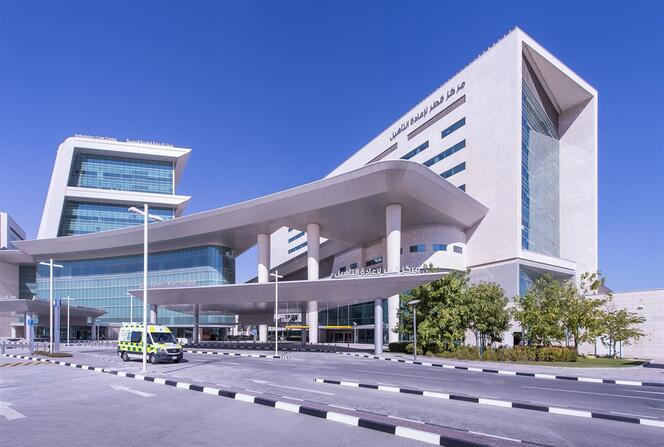All photos by Victoria Scott
Five-year-old Omar is sitting at a desk. In front of him are two photos – one of his mother, and the other of himself. He’s asked to pick the one of his mom, and when he does, both his teacher and his mother, Reem Al Sheikh, erupt into applause.
Omar, a Jordanian expat, has been diagnosed with autism, a disorder that means he has difficulty communicating and forming relationships.
Unable to find the right standard of care for her son in mainstream schools in Doha, Al Sheikh has decided to enroll him in one-on-one intensive teaching sessions at the Child Development Center (CDC) in West Bay Lagoon.
Tucked away on a quiet residential street, this center is focused on providing comprehensive therapies and support for children of all nationalities with mild to moderate special needs in Qatar, and their families. It soft-launched in November, and had a formal opening in March.
CDC was founded by Hasna Nada, a Qatari woman whose son Faisal, six, also has autism. In an interview with Doha News, she said she established the center because she’d been unable to find a place in Qatar that could offer her son the therapy he needed. She continued:
“These kids need 30, 40 hours a week of therapy. After Faisal’s diagnosis, I was advised to try Awsaj – the learning center run by Qatar Foundation. It’s a great program, but it has no places, and a huge waiting list. So, we had no options.
Qatar is the richest country in the world, and autism is very prevalent in the local community, but it’s not spoken about. Every other day I meet a child with autism, and really I don’t understand why nobody is doing anything about it.”
Nada added that the Awsaj Center prioritizes Qataris, making it nearly impossible for expat families to secure places for their children.
Meanwhile, other alternatives are also not very feasible for most families. Therapy and support provided by Hamad Medical Corp. is currently very sparse, for example, with long waiting lists and limited access to therapists, she said.

Though CDC has not been able to obtain formal statistics about autism in Qatar, its own research suggests that 20 percent of the country’s school population has some kind of learning disability.
This figure tallies with estimates from the US, where 5 percent of school children have been given a formal diagnosis of learning difficulties, but a further 15 percent have undiagnosed problems.
Services
Nada set up CDC with the help of a friend, Spanish expat Sabrina Mancuso, whose son is also on the autistic spectrum.
CDC costs notably more than many other educational centers in Doha. But Mancuso told Doha News that while there are several private nurseries and schools in Qatar that cater to special needs children, CDC’s credentials make it stand out from the rest:
“CDC is the only place in Qatar, apart from HMC’s Rumailah Hospital, which has staff qualified to diagnose children with these conditions,” she said. “And we have invested a lot of money in qualified therapists, some of whom we’ve brought over from the USA.”
The center offers a raft of services, including:
- An intensive Early Intervention Program aimed at children ages 3 to 6 years old who have autism and related disorders;
- Occupational Therapy, which helps improve physical and sensory development;
- Speech and Language therapy; and
- Cognitive Behavior Therapy, which addresses anxiety, self-esteem and anger management.
Currently, around 70 children attend the center on a regular basis, with plans to cater to more in September, as CDC now has a waiting list.
Some children attend every morning, five days a week, while others take afternoon classes designed to support their studies in mainstream schools. The center also offers workshops and support for parents. Mancuso explained:
“We strongly believe in educating the parents as much as possible, so they can help their own kids. If the parents know why their child is doing that, or feeling this way, then the prognosis is much better.”
Cost
With a teacher to child ratio of 4:6 in the Early Intervention (EI) class, CDC’s services are not cheap. The five-day-a-week full-time program currently costs QR 20,000 a month, and because the center is not classed as a school, many parents are unable to claim back the cost from their employers, even if school fees are usually covered under their contracts.
Mancuso said parents who cannot afford the services are asked to bring a proof of salary, and then given discounts or scholarships. She continued:
“We want to make the services available to everyone. Globally, this sort of care is very expensive. But one of our goals is to seek out corporate alliances so that we can reduce the cost.”
Despite the high rates, Reen Latif, a Malaysian mother of six-year-old Mikael, believes that the cost is worth it. She’d previously had to pay privately for a shadow teacher at her son’s nursery, and numerous therapists to come to her at home, which became very expensive.
She also had to pay for a psychologist and a behavioral therapist to come to her son’s new mainstream school every day, to try to coax him into the classroom. Speaking to Doha News, she said:
“I wanted to keep him in nursery, because I knew he wasn’t prepared for school, but he couldn’t stay there because of the new rules which say children have to leave when they’re four. So on his first day at school, (my son) freaked out. He hid under a table, and he stayed outside the class for a whole month.”
Reem Al Sheikh also feels that the fees are worth it. Omar has been attending CDC since it opened last November.
In that time, she told Doha News that she has gone from not understanding his needs at all, to understanding what he wants the majority of the time, with the help of picture cards and intensive speech therapy.
“From nothing, I now understand him,” she said. “His behavior is getting better, his tantrums have gone because he can make his needs known, and his eye contact is getting better. He’s a happy boy. I just have nightmares about what if he gets lost, he doesn’t talk, he wouldn’t be able to say who he was. But if he learns to express himself, a lot of things will change.”
Public attitudes
Both mothers agree that access to support services is not the only thing that needs improvement here – attitudes also must change. Al Sheikh said the way people have treated her son has caused her to transform from a “lady” to a “lion:”
“Our society is bad – the way they stare at these kids – you know, if he has a tantrum in a mall or on a plane, they think you’re a bad parent. One woman told me on a plane, ‘you’re the worst mum I’ve ever seen,’ because my son looks normal. You have to keep explaining to people, and it’s hard.”
Latif added that she hopes that eventually, society will look at her son as “just another normal child.” She says she has modest, but definite hopes for his future:
“I just want him to be able to enjoy life like any other kid, without the need for therapy. And I also want him to be independent, so that one day when I leave this world, he’s capable enough to cope without me.”
Thoughts?

